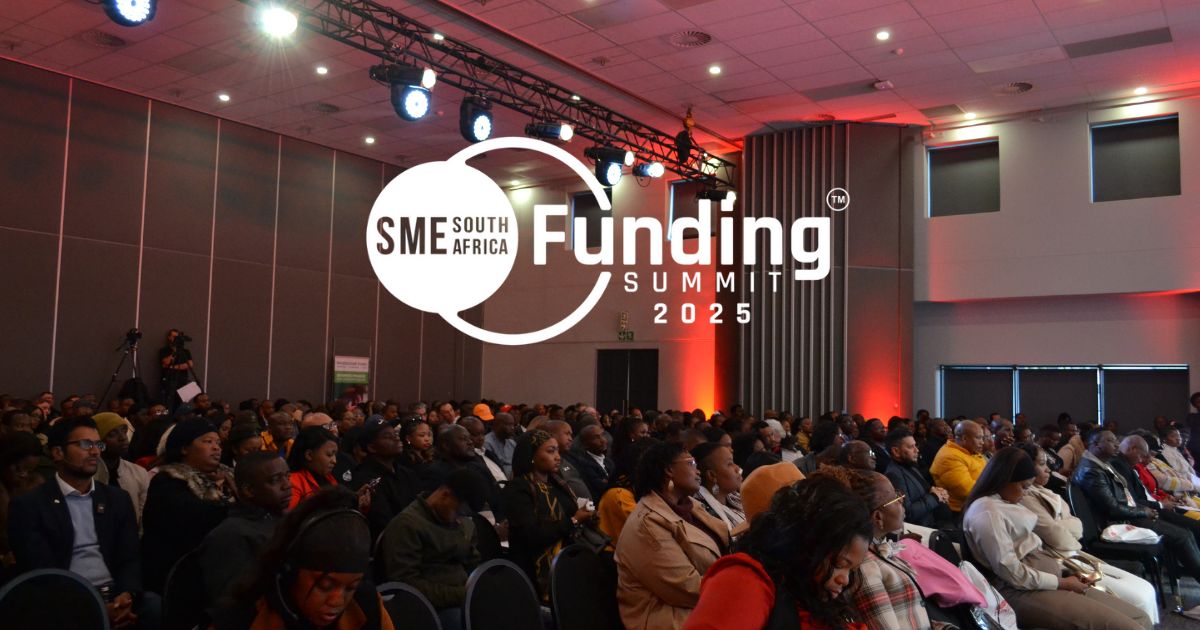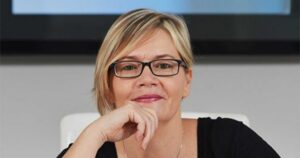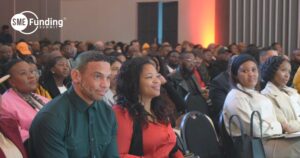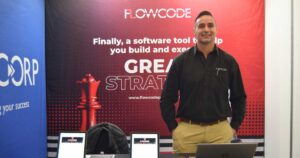
The 2025 SME South Africa Funding Summit took place on the 12th of June at the Empire Conference and Events Venue in Parktown, Johannesburg.
The event brought together hundreds of entrepreneurs, funders, ecosystem builders, and more under one roof, all with a common purpose: to tackle the pressing issues around access to funding for small and medium-sized enterprises (SMEs).
With a strong lineup of speakers, investors, exhibitors, and vibrant networking sessions, the summit served as a vital platform to spark solutions and share strategies for improving South Africa’s funding landscape.
Part 1: Early-Stage Funding
The event kicked off with a powerful welcome from Velly Bosega, CEO of SME South Africa.
Among the standout speakers of the morning was Darlene Menzies, CEO of FinFind, who unpacked the findings from the MSME Access to Finance Report 2025. The report revealed critical insights into how South Africa’s SMEs are accessing or struggling to access funding.
This was followed by the Deputy Minister of Small Business Development, Jane Sithole, who delivered a keynote address on the importance of creating a more inclusive funding landscape. She emphasised the need for more real-time data and accessible reports on SME funding to drive initiatives to create solutions that address the funding gap.
Entrepreneurial inspiration was also front and centre. Sheldon Tatchell, founder of Legends Barber, shared his bootstrapping journey and insights on growing the Legends Barber brand into a success story. His story underscored the importance of faith, determination and collaboration in growing a business.
The first tea break was a hive of activity. Conversations flowed among attendees, funders, and exhibitors, all eager to connect, share, and collaborate.
Part 2: Growth-Stage Funding
During the next session, Donald Valoyi, founder of Zulzi, delivered insights on building a strong pitch deck for early-stage funding. He broke down the essentials investors are looking for, as well as how to position yourself as a business that investors chase.
A highly anticipated panel followed, diving into alternative funding options for early-stage entrepreneurs. Industry experts like Thandeka Dludla from Old Mutual SMEgo, and Jedd Harris from Sourcefin weighed in on how SMEs can think beyond traditional funding institutions.
The session titled “What Venture Capitalists & Angel Investors Are Really Looking For” was another major highlight. Jameel Khan and Shaun Naidoo gave attendees a rare inside look at how funders assess risk, leadership, market potential, and more.
Part 3: Industry-Specific Funding Insights
The afternoon sessions shifted focus to industry-specific funding, tackling the nuanced financial needs across various sectors
Louise Naidoo, product head of FNB Commercial, shared up-to-date funding trends, including sector-focused funding models. The spotlight moment came when Litha Kutta from Land Bank delivered a talk on Agri-Business Funding. His insights were so impactful that he was surrounded by hopeful agri-entrepreneurs eager to ask follow-up questions during the networking session.
A panel discussion between Hlengiwe Makhathini of IDF Capital and Mokgome Mogoba from Kholo Capital tackled Traditional Financial Models vs Innovative Approaches, helping business owners understand how to position themselves for both conventional and alternative funding paths.
Compliance was another important topic addressed by Mosebetsi Seloane from the Gauteng Enterprise Propeller (GEP). He addressed the challenges of meeting funding compliance requirements and how compliance mistakes can prevent businesses from receiving the funding they need.
Closing out the content sessions was Zama Nqadolo, Investment Manager at MIC, who explored The Scaling Blueprint: Strategy, Structure and Story. She outlined how SMEs can build scalable business models while retaining their identity and mastering how to relay their story and prioritise community impact.
Insights From Entrepreneurs at The Funding Summit
We spoke directly to some of the attendees to understand how the summit made an impact.
Lethabo, founder of Laka Beauty, shared:
“I struggle to scale because I only hear about banks when it comes to funding. I came to the summit hoping to learn better ways to access funding. I’m currently reselling in bulk, but I want to create my own products and manufacture locally. Sales are strong, but I face long wait times with Chinese manufacturers – which means my products are sold out for too long.”
Kopano from Bakwena Telecommunications reflected:
“I’ve applied for funding before but always got rejected with no explanation. When I spoke to one of the consultants at the Business Partners exhibition stand, I found out that not having audited financials is an automatic red flag. Platforms should tell us why we were rejected. This summit helped me realise where I’ve been going wrong.”
These stories show the importance of better feedback systems within funding platforms. Entrepreneurs need clarity, whether it’s through automated rejection reports or follow-up communication to improve their chances the next time they apply.
Insights From Investors and Funders at The Funding Summit
One of the major takeaways from the summit was that alternative funding is becoming an increasingly viable option for SMEs that are often overlooked by traditional banks and DFIs. Many of the funders present emphasised that SMEs should not limit themselves to conventional funding sources.
Nolan Ngobeni, Director of Boost Investments, highlighted how events like the SME Funding Summit help funders like himself connect directly with the businesses they aim to support.
“We fund SMEs with government purchase orders, and events like this help us identify the right businesses to support,” he said. “It also gives us a clearer understanding of the challenges entrepreneurs are facing.”
Tshepo Mogale from Oricred echoed this sentiment, reinforcing that there is space in the funding landscape for alternative players.
“We’ve funded over 1,000 SMEs,” he explained. “Entrepreneurs need to know there are options beyond banks and DFIs. At Oricred, we’re not looking to turn people away — we’re here to find a fit. That’s what platforms like this summit help us do.”
This is an indicator that the funding landscape is becoming more flexible, offering practical solutions that cater to the real needs of SMEs, rather than forcing them into rigid traditional structures.
Where to From Here?
The 2025 SME Funding Summit succeeded in doing more than just connecting entrepreneurs and funders, it opened up room for real conversations, unpacked industry data, and empowered SMEs with tools to take their next steps.
However, it’s clear that the work is far from done. More support is needed beyond the summit. Platforms, funders, and government must create systems that demystify funding and give entrepreneurs a fair shot.
The SME South Africa Funding Summit aims to be the number one funding event for SMEs. As this was the first annual funding summit by SME South Africa, we look forward to what this event will bring in the coming years.





